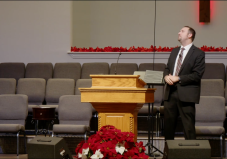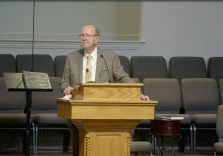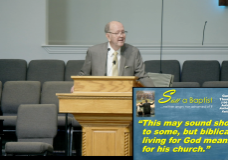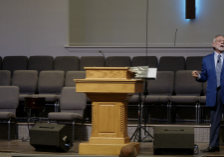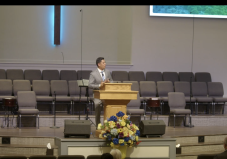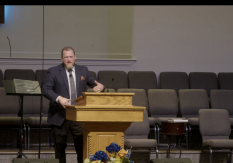The podcast episode centers around the theme of “adorning the Gospel,” emphasizing the importance of how individuals present their faith through their actions and talents. Speaker A shares personal anecdotes from their life, including their journey from being an orphan in Peru to becoming a missionary and artist in various countries. They reflect on the significance of using one’s unique abilities to serve God and others, stressing that everyone has something to offer, no matter how small it may seem. The discussion also highlights the biblical principle of being stewards of one’s talents and encourages listeners to consider how they can better reflect Christ in their daily lives. By intertwining personal experiences with scriptural teachings, the episode calls for a deeper commitment to living out one’s faith authentically and effectively.
Transcript
Adorning the Gospel.
Speaker A:Adorning the Gospel.
Speaker A:For those of you who know us, you know this already.
Speaker A:I will just share very quickly.
Speaker A:I'm originally from Peru.
Speaker A:Was brought to the States by a Gideon giving out Bibles in Peru.
Speaker A:I was an orphan.
Speaker A:Both mom and dad were gone, and I was placed in a foster home in Indiana.
Speaker A:Went to public school, studied art, loved art, anything from carving to painting to drawing, sculpture, everything.
Speaker A:And I did very well.
Speaker A:So my teacher in this public school said, you have talent with that.
Speaker A:You ought to go to a college that will help you develop that.
Speaker A:So I looked for a Christian school at that time, in the 70s that would have an art department at that time, Bob Jones University.
Speaker A:My parents had gone there, my foster parents.
Speaker A:And so they took me, and I did very well.
Speaker A:The first year, it was during the summer between my first and second year, my roommate died.
Speaker A:He was going to be a missionary to Haiti.
Speaker A:I asked God to take his.
Speaker A:If he would let me take his place in the mission field.
Speaker A:And God reminded me that I had already.
Speaker A:When I was 16, at camp, I had already said, lord, I'll go anywhere.
Speaker A:But I said, lord, I don't speak French.
Speaker A:He was going to Haiti, okay?
Speaker A:So I said, anywhere where they speak Spanish.
Speaker A:I can eat their food.
Speaker A:I know their language.
Speaker A:I could fit in somehow.
Speaker A:And during those first few months of my second year, I met a beautiful, tall redhead that's sitting up front here.
Speaker A:Her name is Brenda.
Speaker A:We've been together now for 41 years.
Speaker A:Okay?
Speaker A:Hey, it will hit all of you soon, okay?
Speaker A:And God has blessed us with four children.
Speaker A:We've been in missions for 35 years, okay?
Speaker A:And we've done works.
Speaker A:And we started churches in Ecuador, in the States, in Belize for nine years, three churches.
Speaker A:And now we're in Honduras.
Speaker A:And God has used us in tremendous ways.
Speaker A:She plays the piano by ear, okay?
Speaker A:And after a while, her ear gets tired, so somebody got it.
Speaker A:Boy, this is a tough crowd, I tell you what.
Speaker A:But that has been a tremendous blessing because we've gone to all kinds of places, okay?
Speaker A:And we've had to set.
Speaker A:Set up.
Speaker A:She used to call it church.
Speaker A:What was it?
Speaker A:Porta Church.
Speaker A:Yeah.
Speaker A:And we would just go from one place, another, and set up in Belize.
Speaker A:There was one time that I was preaching at 9:00am in Spanish, okay?
Speaker A:Until:Speaker A:And then we would run about 10 miles down the road to the English work.
Speaker A:And I would preach in English to the Belizeans.
Speaker A:The other was with mainly Guatemalans.
Speaker A:Okay?
Speaker A:I know there's a brother here whose heart is still in Guatemala.
Speaker A:And you don't know how many times I said, buenos dias, Arras us biblias.
Speaker A:And some of the Valencians are like, I'm sorry, I'm sorry.
Speaker A:My wife would be going.
Speaker A:English, English.
Speaker A:So it was a challenge, but we had a good time.
Speaker A:And the Lord blessed.
Speaker A:All of the churches that we've started or helped start, start today are still functioning.
Speaker A:They have a pastor, and we've tried to leave them with a building, which we're doing here.
Speaker A:We would like to leave this church with a pastor.
Speaker A:We even built an apartment.
Speaker A:And thanks to you, we've been able to furnish some of that.
Speaker A:Okay, And I appreciate that because they.
Speaker A:We've had national pastors visit, and they said, wow, this is nicer than my house.
Speaker A:This is beautiful.
Speaker A:This is great.
Speaker A:We want to give the best to the Lord.
Speaker A:And you have done the same.
Speaker A:So thank you for helping us in that.
Speaker A:That pastor then won't have to go out and get a second job and try to raise funds to pay for his rent, to pay for a building.
Speaker A:We will leave him with everything he needs, basically.
Speaker A:Okay, so in part thanks to you.
Speaker A:All right, Titus, adorning the gospel.
Speaker A:Why are you talking about art?
Speaker A:Because, like, to illustrate everything, whether it's with my hands or with my face, or with chalks or acrylics or anything else.
Speaker A:God put a stick in Moses hand and told him, what is in your hand?
Speaker A:And Moses said, it's just a stick, a rod.
Speaker A:God basically told him, give me that rod, and you see what I can do with it.
Speaker A:And when it was God's rod, he was able to part the sea.
Speaker A:God was able to part the sea through him.
Speaker A:You won't know what God wants to do with you and what is in your hand until you give that to him.
Speaker A:And tonight, we're going to give you an opportunity to do that.
Speaker A:Perhaps some of you have been hiding.
Speaker A:Remember the talents.
Speaker A:The one guy went and buried it.
Speaker A:And then he had the gall to say, here is what's yours?
Speaker A:He had done two things.
Speaker A:One, he was lazy.
Speaker A:Two, maybe scared, okay?
Speaker A:But two, he was stealing from God.
Speaker A:What do you mean?
Speaker A:Because remember, the master said, why didn't you at least invest it and give me back what is mine plus interest?
Speaker A:So what he gave him really wasn't worth.
Speaker A:Okay, you know, the economy, you see the buildings going up and everything.
Speaker A:And the price is going up.
Speaker A:Okay, what is worth today?
Speaker A:It wasn't last year.
Speaker A:Right?
Speaker A:So does God have the right to expect more from us next year?
Speaker A:Yes.
Speaker A:Now some of you ladies are looking at me and saying, I don't have talents.
Speaker A:I can't play the piano, I can't play nurse, I can't do any of these things.
Speaker A:I can't sing.
Speaker A:I tasted what you can do this afternoon, okay?
Speaker A:And it was good.
Speaker A:I still have greasy lips from it.
Speaker A:Okay, when is the last time, ladies, that you made.
Speaker A:Some of you can make tortillas, some of you can make brownies or blondies, whichever you prefer.
Speaker A:When is the last time you took a plate of brownies, tortillas, whatever.
Speaker A:It is simple.
Speaker A:You say, well, I don't have a lot of money.
Speaker A:Listen, when you show up at someone's house, neighbor, friend, who don't know Christ, and they've gone through a hard time, they've had a death in the family, they've lost their job, something has happened.
Speaker A:And you said, I just want to be a blessing.
Speaker A:And I want you to know we're praying for you.
Speaker A:That plate of brownies is going to open doors and you'll be able to say things that perhaps you weren't able to say before.
Speaker A:Is there something I can pray for?
Speaker A:Is there something that you want me to ask God?
Speaker A:In your life, how are you doing?
Speaker A:Do you have a relationship with God?
Speaker A:Tell you what, those brownies are going to open that door and they're going to say, wow, nobody ever does that.
Speaker A:Okay, now you have to make them real big because you're in Texas.
Speaker A:Okay, let's read on.
Speaker A:When I gave my talent to the Lord that second year, I thought I changed my major to Bible.
Speaker A:I thought, I'm never going to be able to draw or paint or.
Speaker A:Or do anything.
Speaker A:God has given me more opportunities and someday I'd love to come back and do a workshop at the school with any age kids.
Speaker A:And it's kind of a Bob Ross.
Speaker A:I won't mention the friendly little trees or anything like that, but happy little trees.
Speaker A:That's right.
Speaker A:They're not friendly.
Speaker A:Okay.
Speaker A:And teach them.
Speaker A:I have had parents come up to me and say, I didn't know my kid could do this.
Speaker A:Did he really do this?
Speaker A:You did this for him?
Speaker A:No.
Speaker A:And then I can say, listen, your child has talent.
Speaker A:You need to buy.
Speaker A:And buy her some paints, crayons, anything.
Speaker A:Coloring paper, pens, because they need to develop that.
Speaker A:And they didn't know that till then.
Speaker A:I love to do that.
Speaker A:We've done workshops in Spanish class.
Speaker A:We've done workshops, We've done chapels.
Speaker A:Okay, so all that just to put in a little.
Speaker A:Okay.
Speaker A:You asked me to Come.
Speaker A:I'll drive the 12 hours, brother.
Speaker A:All right.
Speaker A:Let's read.
Speaker A:Titus, chapter two, verse one.
Speaker A:The Bible says, but speak thou the things which become sound doctrine.
Speaker A:That the aged men be sober, grave, temperate, sound in faith and charity in patience.
Speaker A:The aged women likewise.
Speaker A:That they be in behavior as becometh holiness, not false accusers, not given too much wine.
Speaker A:Teachers of good things.
Speaker A:That they may teach the young women to be sober, to love their husbands, to love their children, to be discreet, chaste, keepers at home, good, obedient to their own husbands, that the word of God be not blasphemed.
Speaker A:Young men likewise exhort to be sober minded.
Speaker A:That means don't try out the things you see in TikTok.
Speaker A:Okay.
Speaker A:Sorry, I had to throw that in there.
Speaker A:In all things, showing thyself a pattern of good works.
Speaker A:In doctrine, showing uncorruptness, gravity, sincerity, sound speech that cannot be condemned.
Speaker A:That he that is of the contrary part may be ashamed, having no evil thing to say of you.
Speaker A:Exhort servants to be obedient unto their own masters and to please them well in all things.
Speaker A:Not answering.
Speaker A:Again, not purloining, which means stealing.
Speaker A:Remember the guy with the talents?
Speaker A:Okay, not stealing, but showing all good fidelity that they may adorn the doctrine of our God, of God our Savior in all things.
Speaker A:For the grace of God that bringeth salvation hath appeared to all men, teaching us that denying ungodliness and worldly lusts, we should live soberly, righteously and godly in this present world, looking for that blessed hope and the glorious appearing of the great God and our Savior, Jesus Christ, who gave Himself for us that he might redeem us from all iniquity and purity unto Himself.
Speaker A:A peculiar people, zealous of good works.
Speaker A:These things speak and exhort and rebuke with all authority.
Speaker A:Let no man despise thee.
Speaker A:All right, I have lots of time.
Speaker A:Wow.
Speaker A:Although I don't see the clock.
Speaker A:I'm going to put this one up.
Speaker A:Just.
Speaker A:I know my wife will start going.
Speaker A:Okay, this passage.
Speaker A:Let's go to the next one.
Speaker A:I'm sorry I showed you that picture because we're going to talk about that picture throughout.
Speaker A:All right?
Speaker A:This passage addresses three groups of people.
Speaker A:The aged men, the aged women, the Youth, the servants.
Speaker A:Really?
Speaker A:4.
Speaker A:The word purloining in the Greek and then in the English, talks about stealing.
Speaker A:You say, can a man rob God?
Speaker A:Yes.
Speaker A:Read Malachi and what belongs to him?
Speaker A:And you say, well, 10% belongs to him.
Speaker A:You know what?
Speaker A:I have a secret to tell you.
Speaker A:Everything belongs to Him.
Speaker A:If God has your heart, he has your pocket, he has your billfold.
Speaker A:Why?
Speaker A:Because if you give him your heart, he has everything.
Speaker A:Now, for some of you may be 10%, some of you may be able to give 15, 20, 30%.
Speaker A:I know a man, Christian man, and his name escapes me right now.
Speaker A:He built huge moving, earth moving machines.
Speaker A:And he told the lord, lord, I will live on 10% and give you 90.
Speaker A:And guess what?
Speaker A:God blessed him.
Speaker A:He became a millionaire.
Speaker A:And 10% of a millionaire is pretty good money, all right.
Speaker A:But he was faithful.
Speaker A:If you will say, lord, use whatever I have.
Speaker A:Here's it all belongs to you anyway.
Speaker A:You'll see what God starts doing.
Speaker A:It will surprise you.
Speaker A:Okay?
Speaker A:So good fidelity.
Speaker A:And the phrase there for the servants is that may adorn the doctrine.
Speaker A:Now, that word adorn is interesting in the Greek.
Speaker A:It is.
Speaker A:Let's see, kosmosin.
Speaker A:I had to take Greek three times to pass it, okay?
Speaker A:So I can draw and paint beautiful Greek letters, but the Greek itself is kind of tough for me, okay?
Speaker A:Cosmos.
Speaker A:And that word is very close to cosmos or cosmetics.
Speaker A:Young ladies, what is the most.
Speaker A:If you Google it or whatever you do now.
Speaker A:AI right, chatgpt, look it up.
Speaker A:What is the most stolen item from the stores today in America?
Speaker A:Besides beef, right?
Speaker A:Hey, some people steal steak.
Speaker A:I don't know how they keep it inside their clothes, but cosmetics?
Speaker A:Why?
Speaker A:Because those young ladies have believed a lie of Satan that if you put this stuff on your face, you're gonna be more attractive.
Speaker A:People are gonna like you, especially those young men, okay?
Speaker A:And so they are willing to go to jail.
Speaker A:Why?
Speaker A:Because they want to put this.
Speaker A:Let me just ask you, who knows, young ladies, what is in cosmetics?
Speaker A:What are two products that if I brought to you right now, you would say, oh, no, I wouldn't touch that pig fat.
Speaker A:I worked at a bacon plant and there were tankers full that were going.
Speaker A:And I said, oh, that's to destroy.
Speaker A:Oh, no, that's a gold mine.
Speaker A:We sell that to the cosmetics.
Speaker A:They put that in every lipstick and every pig fat.
Speaker A:Yes, and what else?
Speaker A:Dirt.
Speaker A:Clay.
Speaker A:Yes, there are clays.
Speaker A:Did you know that there is a clay color for every facial color in the world?
Speaker A:There is black clay, there is white clay, there is yellow clay, there is red clay, There is even green clay, if you're sick, okay, what was man made out of?
Speaker A:Clay.
Speaker A:But you young ladies are willing to put pig fat with clay on your face so that you can be attractive.
Speaker A:Let me tell you a secret.
Speaker A:Most of you, okay, are beautiful and don't need any.
Speaker A:But some of you may need a little touch up here and there, all right?
Speaker A:And that's okay.
Speaker A:That's okay.
Speaker A:I'm not against it.
Speaker A:All right.
Speaker A:Just don't put so much on that we don't recognize you, okay?
Speaker A:They might think you work at a circus or something.
Speaker A:All right?
Speaker A:The word cosmeo means to adorn, to set in order, okay?
Speaker A:And it also means to arrange in an orderly fashion in a proper way.
Speaker A:Christian women.
Speaker A:Then in First Timothy 2, 9, it says, Teach the women to adorn themselves.
Speaker A:There's that word, cosmos, okay?
Speaker A:And they are to do it with shame facedness.
Speaker A:Okay?
Speaker A:Sobriety.
Speaker A:Not putting gold in their hair.
Speaker A:You say, well, I don't put gold in my hair.
Speaker A:Did you know the Greek women in the first century would adorn and do these huge hairdos with actual gold ribbon and pearls?
Speaker A:And that is what Paul is talking about here, saying, don't go that far.
Speaker A:But he didn't say, you know, just go out and go to Walmart like a lot of those other people you see at Walmart that look like they just got up in their pajamas and their hair sticking out one side.
Speaker A:You're going, hi.
Speaker A:He's not talking about that either.
Speaker A:Okay.
Speaker A:You do arrange yourself properly, but don't go to an extreme.
Speaker A:That's what he's saying, arrange yourselves.
Speaker A:But not in an expensive or extreme ornate manner.
Speaker A:Did you know that you can be, I'll say it right out, homely.
Speaker A:Some of you look in the mirror and you think, ah, and it's not even Halloween.
Speaker A:God made you.
Speaker A:He made you in his image, okay?
Speaker A:And we have a daughter who was beautiful.
Speaker A:Now I know you say, well, that's your father.
Speaker A:No, other people said it at restaurants.
Speaker A:People come up and say, did you know that you have a beautiful daughter?
Speaker A:No.
Speaker A:Are you serious?
Speaker A:Oh, wow, she is pretty.
Speaker A:No, of course we knew she was beautiful.
Speaker A:We just didn't go around talking about it.
Speaker A:But other people told her that.
Speaker A:So we taught her to say something.
Speaker A:When people said that to her, did you know you're so beautiful?
Speaker A:What is she going to say?
Speaker A:The pressure is on.
Speaker A:She's going to say, no, not really.
Speaker A:You need glasses.
Speaker A:No, we taught her to say, thank you, but it's more important to be beautiful on the inside.
Speaker A:And then people go, whoa, you're right.
Speaker A:Yes.
Speaker A:Because the world puts the emphasis on the outward.
Speaker A:Okay, Miss.
Speaker A:Here she comes.
Speaker A:Miss America, what does she get?
Speaker A:Money, cars, whatever.
Speaker A:All kinds of things, right?
Speaker A:Why?
Speaker A:Because she's beautiful.
Speaker A:Beautiful body, beautiful face.
Speaker A:Did you know that she didn't have anything to do with that genetics.
Speaker A:God made her that way.
Speaker A:Now does the man say, here she comes, the product of God's work?
Speaker A:No.
Speaker A:I often ask, why don't we have instead of the most beautiful girl, the hardest working girl.
Speaker A:Oh, the most honest girl, the kindest girl.
Speaker A:Why don't we give prizes for that?
Speaker A:We give prizes because Satan has taught us that the outward is more important.
Speaker A:You read the Bible from COVID to cover and you're going to see that God puts the emphasis on the inward grow in grace, add to your faith.
Speaker A:It doesn't say become beautiful, but we believe that, don't we?
Speaker A:And so if we're not.
Speaker A:Inner, beauty is more important.
Speaker A:Proverbs says, keep your heart above all things.
Speaker A:It doesn't say, keep your face, your hair.
Speaker A:No, keep your heart.
Speaker A:Why?
Speaker A:That's what's going to heaven.
Speaker A:This, believe it or not, is going to be buried and it's going to become dirt or ashes, depending on how you die.
Speaker A:Okay?
Speaker A:Probably in these express ways, you will die in ashes.
Speaker A:Okay?
Speaker A:All right.
Speaker A:I used to have a dollar bill in here.
Speaker A:Let me just ask you.
Speaker A:Most of you know, probably here in Texas is 10, $100 bill.
Speaker A:Okay.
Speaker A:There is a symbol on the inside, in the middle of the dollar bill.
Speaker A:What does it say?
Speaker A:Thank you.
Speaker A:In God We Trust.
Speaker A:Raise your hand if you believe that we can trust God.
Speaker A:Okay.
Speaker A:Some of you are doubtful.
Speaker A:Okay.
Speaker A:I understand in this economy and after, we won't get into politics.
Speaker A:I know it's hard.
Speaker A:We can trust God.
Speaker A:We can trust his word, we can trust his promises.
Speaker A:Here's a question.
Speaker A:I'm not going to ask you to raise your hand.
Speaker A:Can God trust you?
Speaker A:Ooh, never thought about that.
Speaker A:If you go to First Thessalonians, we're not going to go there.
Speaker A:Two, four, it says, God has entrusted us with something so precious that he didn't trust it to the angels.
Speaker A:The Gospel.
Speaker A:In your hand, you are holding the eternal destiny of someone.
Speaker A:What?
Speaker A:Yes.
Speaker A:There is someone out there that if you go to them, they're ready to receive, they're ready to believe.
Speaker A:You just need to go and share it with them.
Speaker A:And you're holding their future in your hand.
Speaker A:God has entrusted you and me with the future of so many souls.
Speaker A:Now you just need to do something about it.
Speaker A:It's not easy.
Speaker A:Paul said in 2nd Corinthians 5, we've been given, committed unto us the ministry of reconciliation.
Speaker A:God trusted us with something precious.
Speaker A:Why is it precious?
Speaker A:He planned before the beginning of this world, before the Creation.
Speaker A:He already planned that he was going to send Jesus to die on a cross for us sinners.
Speaker A:Did you know that God knew your name and whether you were going to have lots of hair or no hair?
Speaker A:I was teasing Brother Brandon.
Speaker A:The monkey said, go out there and preach the gospel with all.
Speaker A:It's not baldness.
Speaker A:I know.
Speaker A:It's boldness, not baldness.
Speaker A:I was teasing him.
Speaker A:Or boulders.
Speaker A:Okay.
Speaker A:Neither one.
Speaker A:God knew how many hairs you were going to have and what color they were going to be and whether it was going to be kinky or straight.
Speaker A:Before he created the world and God knew you were going to sin.
Speaker A:And God sent the answer.
Speaker A:God sent the remedy.
Speaker A:God sent the Savior even before he created man.
Speaker A:And we wonder, knowing this, God still went through with it.
Speaker A:We know I'm going to hurt if I go in there.
Speaker A:If I go through that traffic again, I may get killed.
Speaker A:I'm a little nervous about.
Speaker A:We don't go there.
Speaker A:God knew this was going to hurt him.
Speaker A:In Genesis 6, it says he looked at his creation after having said, this is all very good.
Speaker A:In Genesis 6 he said it hurt him in his heart to have created man because he was going to have to destroy it.
Speaker A:In the New Testament, what is the word?
Speaker A:Grieve.
Speaker A:Not the Holy Spirit.
Speaker A:When he created us, he created us.
Speaker A:And he put into us a lot of elements, a lot of things that he has.
Speaker A:He has at least five senses.
Speaker A:He has emotions.
Speaker A:He gets angry.
Speaker A:But he also rejoices when someone gets saved.
Speaker A:Do you want God to rejoice?
Speaker A:Help bring a soul to Christ.
Speaker A:There will be a party in heaven.
Speaker A:It says there's rejoicing in front of the angels.
Speaker A:Who's rejoicing?
Speaker A:Who else?
Speaker A:Who sent his son?
Speaker A:Okay, sorry.
Speaker A:Where are we at?
Speaker A:God is a God of order.
Speaker A:He has created everything in order.
Speaker A:And we are to arrange the gospel in such a way that it reflects Christ.
Speaker A:Now I'm going to.
Speaker A:I have a couple minutes.
Speaker A:I'm going to go on.
Speaker A:We're going to go to the next one.
Speaker A:Can God trust you?
Speaker A:Keep going.
Speaker A:Faithfulness.
Speaker A:Light shines.
Speaker A:You all have been seeing.
Speaker A:I noticed you have gorgeous sunsets.
Speaker A:Probably sunrises too.
Speaker A:I've been sleeping through that time.
Speaker A:But no.
Speaker A:We went fishing and we saw a beautiful sunset.
Speaker A:Sunrise.
Speaker A:Okay.
Speaker A:Did you know that the moon does not produce or emit its own light?
Speaker A:Surprise.
Speaker A:It reflects the sun.
Speaker A:The light from the sun.
Speaker A:We ought to be doing the same and reflecting the light of the gospel from the S O N the sun.
Speaker A:So your life ought to make you as A Christian more and more like him.
Speaker A:There are many passages where it says, we shall be like him and we're going to be made.
Speaker A:More and more, God is trying to conform us to the image of his Son.
Speaker A:Okay, I'm going to close.
Speaker A:Keep going.
Speaker A:Let's see if you look at yourself in the mirror, if there are things that you need to remove.
Speaker A:Keep going to the next one.
Speaker A:Next one.
Speaker A:Okay.
Speaker A:There is a saying.
Speaker A:Your talk talks and your walk talks, but your walk talks louder than your talk talk.
Speaker A:Say that three times fast, but not here.
Speaker A:Okay.
Speaker A:What does that mean?
Speaker A:A lot of people say, I have a lot of faith, I pray a lot.
Speaker A:Oh, I'm a man of.
Speaker A:I'm a woman.
Speaker A:I.
Speaker A:Okay, from here out.
Speaker A:But what you do outshine, shines bigger is louder than what you say.
Speaker A:And people are looking at that.
Speaker A:At work, at school, in your neighborhood, are you reflecting the light of the sun?
Speaker A:Keep going.
Speaker A:We talked about communications a little bit.
Speaker A:Communication with removing things.
Speaker A:We're going to remove these two things from this picture so that the message of the lake and the beautiful mountains is going to be shown.
Speaker A:Keep going.
Speaker A:Yeah.
Speaker A:Is your family communicating this way?
Speaker A:Everybody doing their own thing?
Speaker A:I hope not.
Speaker A:Keep going.
Speaker A:All right.
Speaker A:This lake, I have to read it because it's a weird name.
Speaker A:This is Mount Shuk San in the North Cascades national park in Washington.
Speaker A:It is one of the most photographed lakes in the usa.
Speaker A:Okay.
Speaker A:As you look at this picture, you see the image of the mountains reflected on the water.
Speaker A:What are things that would cause that reflection to be blurry?
Speaker A:Anybody?
Speaker A:We were in a lake.
Speaker A:Waves.
Speaker A:What causes the waves?
Speaker A:Wind.
Speaker A:Interesting.
Speaker A:Isn't that what Peter got scared at the waves and the wind?
Speaker A:Okay.
Speaker A:He got distracted.
Speaker A:All right, Tonight, I'm going to ask pastor to come up in one minute.
Speaker A:Tonight, there may be something you need to remove from your life so that the water in your life reflects Jesus more accurately.
Speaker A:Okay.
Speaker A:Perhaps it's a relationship, a friendship.
Speaker A:Maybe it's an addiction, something big that is just totally blurring the image of Christ in your life.
Speaker A:All right?
Speaker A:It may be something you need to add.
Speaker A:Reading your Bible, praying, sharing the gospel.
Speaker A:All right, you see it better, but it's still blurry, isn't it?
Speaker A:We're going to have the lights turned down, and then we're going to have a word of prayer, because I am going to turn on another light.
Speaker A:And let's say it's like the word of God, which is light that should shine in your life.
Speaker A:That will show you where you need to make changes what you need to remove from the water of your lake, of your life to make the image more clearly.
Speaker A:All right, who's going to turn the lights on?
Speaker A:Don't give me this somebody.
Speaker A:Pastor.
Speaker A:Okay.
Speaker A:All right.
Speaker A:One, two, three.
Speaker A:Can you see Jesus in that mountain?
Speaker A:Can you see him?
Speaker A:Now you say, oh, I didn't see him before.
Speaker A:That's right, because we were distracted by the beauty of the lake.
Speaker A:And people may be distracted by the beautiful things you do in life, or they may be distracted by the obstructions.
Speaker A:Are they seeing Jesus in your life?
Speaker A:So let me finish with these questions.
Speaker A:Is your life accurately clearly reflecting God's qualities?
Speaker A:Can people see Jesus in you clearly?
Speaker A:Do you walk like him?
Speaker A:Do you talk like him?
Speaker A:Do you respond to things in life like he would?
Speaker A:Are you removing the ripples that are blurring the image of Christ in order to reflect his image?
Speaker A:Pastor, Bring the lights back up.
Speaker A:We'll have a verse invitation, So I'll stand.
Speaker A:We'll have a verse invitation tonight.
Notice a problem?
Our sermon archive represents hundreds of hours of cataloging and dedication by staff and volunteers, but we do not always get things right. Report wrong preachers, titles, or mismatched videos here.

